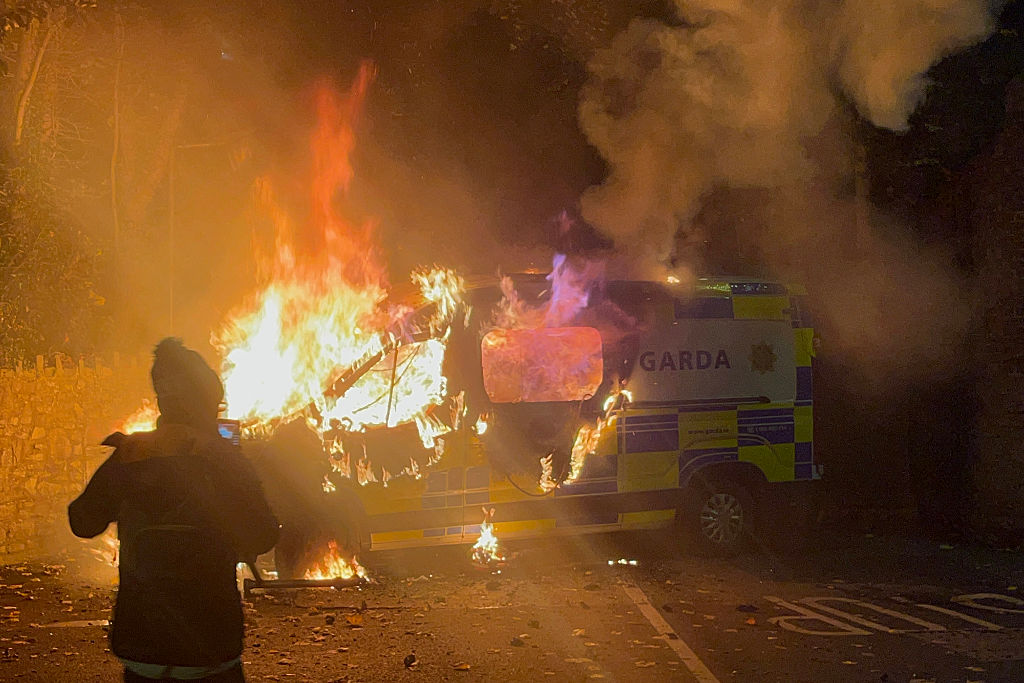Labour’s plans to overhaul Britain’s overstretched asylum system have forced the Irish government to do the same. As the Northern Irish border is the only international border across these islands, Shabana Mahmood’s pledge to create ‘by far the most controlled and selective [asylum system] in Europe’ left Dublin with little choice. Ireland’s Minister for Justice, Home Affairs and Migration – Ireland’s equivalent to the Home Secretary – Jim O’Callaghan warned that Ireland must be ready to adjust its own policies to prevent a surge in applicants travelling via Northern Ireland.
Labour’s announcement has heightened fears that Ireland could be seen as a ‘soft option’ compared with its neighbour
Labour’s announcement has heightened fears in Dublin that Ireland could be seen as a ‘soft option’ compared with its neighbour. ‘I am committed to ensuring that Ireland is not viewed more favourably than the UK’, O’Callaghan insisted. Just as British critics often contrast UK policy with countries perceived as less permissive on the continent, some in Ireland now worry about unfavourable comparisons with a British government intent on sharply reducing asylum numbers.
As in Britain and across Europe, immigration has become increasingly salient in Ireland. The country’s cost of living and housing crises have intensified public concern, especially as arrivals have risen sharply over the past few years. On rare occasions tensions have spilled into violence, including a mob attack in October in which anti-immigration protestors set fire to a car.
Ireland’s migration patterns have changed considerably. After years of net emigration following the financial crash, the mid-2010s marked a reversal, with almost a decade of net inflows. For four consecutive years, more than 100,000 people have arrived annually – a record not seen since the final years of the Celtic Tiger (though net migration dipped slightly this past year). External shocks have driven much of this: Brexit made Dublin a more attractive destination for EU citizens seeking English-language opportunities, while Ireland has taken in more than 110,000 Ukrainian refugees since Russia’s full-scale invasion began.
Tanaiste Simon Harris was reflecting public anger over these figures when he conceded that migration levels were ‘too high’. With Ireland’s population growing by a third in two decades, his remarks were hardly radical. Yet they drew sharp criticism from parts of the left, with one TD accusing him of ‘populist politics’. Harris defended his comments on the same day O’Callaghan confirmed that asylum policy would be reviewed. Helen McEntee, his predecessor at Justice, claimed last year that up to 80 per cent of asylum seekers entered Ireland via the UK – an estimate O’Callaghan repeated before an Oireachtas committee this week.
Ireland remains part of the Dublin Regulation (previously known as the Dublin Convention) which allows EU states to return asylum seekers to the first member state they entered. If the UK were still a signatory, Dublin could simply return applicants who crossed the border from Northern Ireland. But Britain left the system at the end of the 2020 – and even before Brexit, returns between the two countries were modest. Consequently, Ireland has sought alternative arrangements with the UK. Legislative attempts to fix the process have produced mixed results, and although an operational agreement now exists – and relations have been warmer under Keir Starmer – Britain maintains it has ‘no legal obligation’ to accept asylum seekers back from Ireland. In the current climate, the Home Office is highly unlikely to shift that position.
O’Callaghan’s remarks came a day before a government reshuffle triggered by finance minister Paschal O’Donohue’s move to the World Bank. Like Shabana Mahmood, O’Callaghan is viewed as an effective minister – and a potential future party leader. He has openly expressed interest in the role before, and Fianna Fail’s disastrous presidential campaign may accelerate the opportunity. The collapse of Jim Gavin’s candidacy over an old rent dispute has intensified questions over whether Taoiseach Micheal Martin can remain as leader. Martin, the party’s second-longest serving leader after Eamon de Valera, is due to rotate roles with coalition partner Fine Gael’s Simon Harris in 2027 – a possible opportunity for leadership rivals to move.
O’Callaghan retained his justice portfolio – both a reward for his performance and an acknowledgement that he is trusted with a difficult brief, much like Mahmood’s shift to the Home Office earlier this year. He has pledged to publish Ireland’s own asylum bill by the end of the year. Although relations between London and Dublin have improved, the UK is unlikely to agree to deeper cooperation, at least formally. Ultimately, both Mahmood and O’Callaghan will be judged on a single metric: whether they bring the numbers down.







Comments